Today I'm beginning a new blog series called, "Good for Your Soul" Many of you have commented to me how much you've enjoyed reading the posts particularly in the category, Caring for the Soul. So I thought that it would be great to devote a series on the next several Thursdays to practices I've noticed in myself (and others) that are life-giving.
First up, hospitality.
Hospitality: it's such a buzz word in Christian circles along with its counterpoint words like: "Let's fellowship with each other?" "Let's break bread" and "Let us welcome the stranger." These phrases sounds so holy, don't they?
But, it's so much more rare to actually practice them.
We meet each other in public spaces. We keep our homes private. Nobody stumbles to coffee pots in their pajamas anymore while hosts unashamedly show off their messy refrigerators to offer their guests the creme and sugar.
Both on what it means to receive as guest and what it means to also receive as host.
During my third year of seminary, I served a United Methodist parish as their student associate pastor. It was a lovely little church set in low country of Eastern North Carolina. I worked under a senior minister with serious standards for his students. Pastor Jerry would tell me, "You must love people to be in the church. You must really know them." (Some great advice for all pastors, I believe!).
As part of my training and because I commuted on the weekends an hour and half to work, Pastor Jerry arranged for me home stays every Saturday night. Each week I'd be hosted by a different family in the church. We'd share a meal on Saturday, Sunday morning and sometime even Sunday after church too!
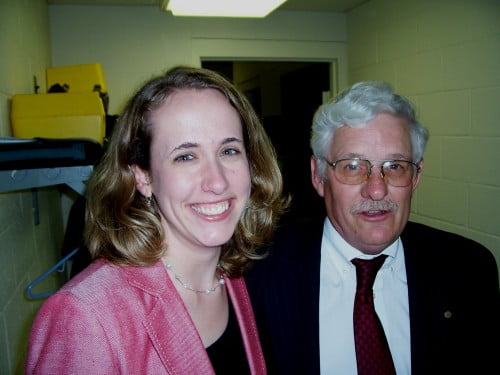
When I first heard this news, I felt intimidated, of course. My internship ran the entire school year. That would be a lot of homes! And a lot of moving around! Plus I'm allergic to cats. And, what if I entered a place where I felt uncomfortable? So many questions ran through my mind.
While there were some unique experiences, overall it was one of the best trainings for ministry I ever received. I got to know a congregation so well in a short period of time. I learned what made people excited. I learned what made people anxious. I learned what they really thought of the sermon I preached the week before!
For one year, I lived, ate and sat in my pajamas alongside members of my church. And I experienced that some of the best, most life-giving conversations happen in the home-- a place where everyone is relaxed enough to begin to talk about what matters to them the most . . . especially later at night.
What instruction for how to learn to be a guest!
But now that I'm a "grown-up" in my own home and have a not-as-nomadic life than I did during our Virginia/ Oklahoma years, I'm beginning to think again about the gifts of hospitality from the new lens of host.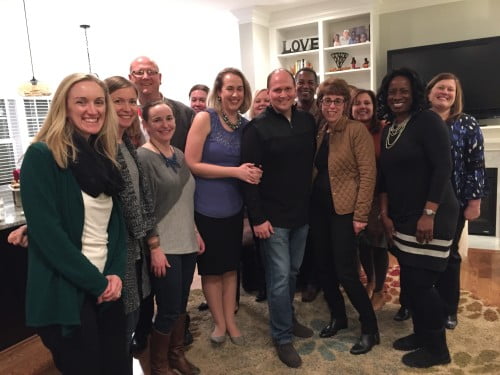
When Kevin and I bought our current house in October, we knew there was space in it we didn't technically need. We could have bought a smaller condo in the city and done just fine. But we decided on our house because we wanted to be intentional about our practice of hospitality. Though we'd always considered ourselves the kind of people open to guests before (with a really cool visitors book I might add), we wanted to take it up a notch. We wanted our house to be a place that brought comfort, peace and joy to those who needed it. We wanted to be open to whoever needed a place to stay.
Seven months in, I have to say, hospitality has been one of the greatest gifts of this season. Hotel Hagan is up and running with steam!
And this is what I know: being a host is full of gifts of its own.
For when anyone stays with us, they leave a piece of themselves behind. And when they leave, it's a joy to think of dear ones reclining on our couch or making themselves a salad at our counter. Or telling stories over cups of tea or laughing without end while sitting on the floor. What memories have been made in our new space already! Memories that fill our walls with echoes of joy.
So let not all of our weekly meals be filled with take-out and grabbing a Powerbar on the run. Let us not always stay in a hotel because it's easier. Let us not be afraid to wash more dishes and do extra loads of laundry.
Our souls will thank us. God just might show up on our doorstep.
Excerpts from a sermon preached at Springfield Christian Church, Springfield, Va on Zephaniah 3:14-20
 Here's a great unifier of the what it means to be human: we’ve ALL failed at something If not at a lot of somethings. (And maybe even a lot of somethings today!) And when we fail, we don’t like to talk it!
Here's a great unifier of the what it means to be human: we’ve ALL failed at something If not at a lot of somethings. (And maybe even a lot of somethings today!) And when we fail, we don’t like to talk it!
However, in the past couple of years I've noticed, there’s a new willingness among many of us to embrace failure as a part of our lives. "Vulnerability" is on the rise, google says, as a topic we discuss with friends. And in response, there’s a growing group of social commentators and bloggers joining in the conversation about failure.
One of these is over at More magazine, Kathy Caprino. Recently she embarked on a series of posts called: “The 52 Worst Mistakes I’ve Made.”
Here are some of them on her list:
#4 Spending too much money on her business before learning how to earn
#13 Staying too long in a job she hated, not realizing it will, eventually, hate her back
#33 Letting people walk all over her because she felt badly for them
#45 Spending more time complaining about her situation than changing it
Identify with any of these?
It's a book of the Bible that has a lot to say about failure.
For if we were to read the book of Zephaniah from cover to cover, what we’d realize is that 85% of it could fall in the category of “the day of wrath says the Lord” Or, in simpler terms: people of God “you’ve failed big time.”
As the word of the Lord came to Zephaniah son of Cushi in chapter 1, we learn that many in Zephaniah's time worshipped other gods like Baal, Molech, and the starry hosts. They’d not kept up their spiritual practices. They'd lived selfishly to the core. They’d also failed to be a light to the nations. They’d forgotten their responsibility to bless other people as was a part of God’s covenant with their ancestor Abraham.
So, Zephaniah spoke against Philistia, against Moab and Ammon, against Cush, against Assyria, and then begins chapter 3 with a word of judgment against Jerusalem.
Zephaniah speaks most harshly to Jerusalem at the end saying in chapter 3 verse 1: “Woe to the city of oppressors, rebellious and defiled! She obeys no one, she accepts no correction. She does not trust in the LORD, she does not draw near to her God.”
So if the layers of failure weren’t described on enough, Zephaniah’s book paints a picture of a God who likes to punish.
Besides not liking to read about our own failures, texts like these force us to look at the realities of life with God. God seems to be all about doom and gloom. Or as one of my nephews asked me after hearing a Sunday School lesson once on the tales of the prophets, “Is God always angry like a monster with a couple of heads?”
But looking at the full picture is important because of where the full story is going. By time we arrive at Zephaniah 3:14, the
 tone has changed.
tone has changed.
It’s a complete change of tune! It’s a word of hope for Zephaniah says it’s time to be happy! It’s time to sing loud. It’s time to shout. It’s time to rejoice and exult the Lord with all your heart! For verse 17 tells us that “The Lord, your God, is in your midst” and God “will rejoice over you with gladness.”
Here we might be confused. I know I was as I dug into this book this week. But besides thinking that the prophet Zephaniah is bi-polar and can’t make up his might for what his message might be, is there an alternative?
Look with me at verse 20: “At that time I will bring you home, at that time when I gather you; for I will make you renowned and praised among all the peoples of the earth.”
Consider this modern day example.
I have a friend who’s first born son left home at 18 years old.
He hated the rules and the restrictions placed upon him by his mom and dad so he couldn’t wait to get out when he was of legal age to leave. At first, the boy did ok. He lived with some friends. He got a job at the local grocery store, working the night shift to make extra cash. But of course, soon he learned the harsh realities of life. He needed his family. He needed more education. Or some combination of both if he wanted to live the kind of life he grew up with at home.
So when the calls invitations came and kept coming to consider joining the brotherhood of a local gang, they got harder and harder to refuse. The young man was promised money and life in a community. And, one day he joined. Five years passed. This boy’s parents did not hear from them again.
They heard from the grapevine of neighbors that their son was in and out of jail. They heard that sometimes he slept on the streets. They tried hard to reach out to him, but they never heard a word.
They loved their son. They wanted to be in relationship with him. They wanted him to make better choices for his life.
But then one day, they got a phone call. It was about around this time of year. It was their son. “Could I come to Christmas dinner?” he asked straightway. “I’m sorry, mom,” he said. “I know I’ve disappointed you big time, but I want be with family at Christmas.”
Of course these parents could have said no out of bitterness. But how could they? This was the moment they’d dreamed about for ages!
Only the best music would do.
Only the best turkey would be baked.
Only the brightest bows of presents under the Christmas tree would be added.
Then after supper there would be dancing. Lots of it. And so much laughter!
In those moments, who cared about the failures of the past? A turn had been made of relationship! These parents forgave their child. They just wanted to look at him. Hug him. And adore how handsome he was!
I have to imagine that this look is exactly the way God was trying to communicate to the people in Zephaniah’s time. The look of total love. That’s what God wanted the people to most see!
For yes, there had been failure.
For yes, there had been anger on God’s part.
For yes, there had been broken ties of relationship.
But SUCH WOULD NOT last forever. For God loved Judah. God was just waiting on Judah to hear the word and come home.
And God’s deepest desire through it all was to say, WELCOME HOME! Come sit around the fire. Eat some amazing food. And know that I love you. I’ve always loved you. I’m not angry anymore.
And what good news this is for our Advent, for our lonely hearts, for our longing hearts, for our broken hearts! God will not stay angry at forever. God is a loving parent who wants to draw us close! God wants to just sing over us, rejoice over us and say thanks be over us!
So it is with great joy I give you this invitation-- come on home. God wants to welcome you! Christ will soon be born. 
Two months ago, my husband, Kevin and I moved. It’s wasn’t a new state kind of move or even a new city move. We relocated 10 minutes across town in the same zip code to a home we hope we’ll be for a while.
And with it came change. The need for a new driver’s license. The need for a new dry cleaners and to try out the grocery and drug store in walking distance to where we now live. I mean, why drive across town if you don’t have to?
Although this is a move we chose and are happy about, there’s a part of me that longs for our old house.
I miss my evening walking route on my old street.
I miss being next to a great Target.
I miss the clerks at my neighborhood post office.
Of course, these longings are hardly worth uttering aloud for fall into the category of “first world problems,” but all this thinking has turned my mind toward an experience that is more universal and all the more common these days: being a refugee. Those who moved recently too, but not by choice.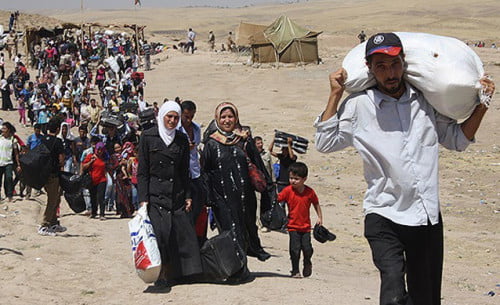
As photos and stories of Syrian refugee have filled my newsfeed over the past several months and we’ve entered senseless debates on whether or not refugees are welcome in the United States, I’ve tried to pick out a story or two to really stick with closely.
In these stories, I’ve thought of what it’s like to be a mother, a father and a child without permanent home in a nation that is not their own.
I’ve thought about those who wake up camps without anything familiar in reach and with basic necessities scarce.
I’ve thought about how unsettling it must feel to be on the move with your fate held in the hands of politicians and military leaders who often forget all of our shared humanity.
Two weeks ago, while in Nairobi, Kenya I was having lunch with a friend who escaped Zimbabwe during the 2002 political coup within inches of her life. Without desiring it, she too was forced to move with no preparation to a place that felt nothing like home. After leaving, “I longed for my old life desperately,” she told me. Though she was glad to be safe and with loved ones, “The place I most wanted to be for years was Zimbabwe.”
You can read the rest over at the Alliance of Baptist website where I am one of the columnists for the Voices series.
A Sermon Preached at Oaklands Presbyterian Church, Laurel, MD from Mark 6: 1-13
 Sing with me if you know the words.
Sing with me if you know the words.
God bless America, My home, sweet home. God bless America. My home, sweet home.
Gave proof through the night that our flag was still there. Oh, say does that star-spangled banner yet wave
O’er the land of the free and the home of the brave?
Such are words that we’ve heard a lot over the course of the weekend haven’t we? Especially if you drove down to the mall and braved the crowds of the fireworks show last night or even if you just watched fireworks from the comfort of your living room tv.
And if you’re anything like me, the words of these patriotic songs are stuck in my head with the re-play button going on and on. And in the case of these two that we just sung—“God Bless America” and “The Star Spangled Banner” the lyrics go back to one word: home.
“My home sweet home . . . land of the free and home of the brave”
It’s a weekend that makes us want gather around the table with friends and family to mark what we call home in this world—these are my people, this is where I live. We celebrate our presumed security in this land. What can be better than gatherings of watermelon, friends and fireworks?
But it also is a day that can bring about loneliness— when your family doesn’t invite you home because you’re different than the rest OR because a military mission keeps your beloved in another country, OR when your hourly job requires you to work while everyone else plays.
And it’s also a day that reminds many of us that even if we claim a country as our “home” we can also feel as though we don’t belong here—when the United States government takes actions that do not support the wellbeing of those in our nation of origin.
SO, how interesting to read our gospel lesson this morning taken from Mark chapter 6—a chapter that tells us about Jesus’ experience of going home in context of all our thinking about HOME in the United States.
Jesus just completed a healing mission of a little girl, Jarius’ daughter and another woman who had not stopped bleeding for 12 years.
And with this, his fame grows throughout the land. People in Galilee are beginning to recognize that Jesus is truly something special—maybe even from God? With so many people approaching him and wanting to chat with him, he felt tired. He needed a break.
For home is a place where we can just exist, where we can not worry about being anything other than ourselves, and home as place where we can find rest for our souls.
Do you know a place like that in your life?
Author Maya Angelou once said: “The ache for home lives in all of us. The safe place where we can go as we are and not be questioned.”
Jesus had that place. And it was called Nazareth.
He headed home and brought his disciples with him.
But as is the case with many of us, Jesus couldn’t go home and not do his thing too.
Often when my husband Kevin, a business savvy kind of guy goes home to visit his family in South Georgia, his arrival comes with a list of things his parents want him to do for them while he’s around. Things like looking at legal contracts or business plans or he helps his mother print pictures from their computer. Why? Because it’s what he’s good at and even at home, there are people around who need you to offer your best skills. We never completely rest, do we?
And the same was true for Jesus. In the town of Nazareth, his people knew that Jesus excelled at teaching. So first stop: synagogue.
Jesus taught. And of course he got rave reviews. Verse 2 of our text tells us that many who heard Jesus were “astounded.”
Almost too astounded because in the next breath, they started making those side comments like: “Is not this the carpenter, the son of Mary and brother of James and Joses and Judas and Simon, and are not his sisters here with us?”
It’s as if you can feel the tension building as you read.
Oh, who does Jesus think he is? Oh, no he didn’t . . .
And by the end of verse 3, Mark says that the Nazareth worshippers officially took offense at homeboy Jesus.
They closed their ears.
Home, I guess was not really home after all for Jesus.
Jesus shuts down too saying his famous line, “Prophets are not without honor, except in their hometown, and among their own kin, and in their own house.”
Or, in other words, home is not what it used to be for me.
With these closed hearts, the end of what could have been both a restful recovery for Jesus and a fresh experience of God for the hometown people ends abruptly. In such an environment Jesus could not perform any miracles.
It was a watershed event in his life that was capsized by the church ladies he’d grown up with no longer wanting to pinch his cheeks and say, “Good job, son.”
It’s an experience of life that many of us, like Jesus, know all to well.
At this juncture, Jesus was left the big question of: “What is home? Where was his home?”
And this my lead us to ask ourselves—where is home for us? Is it just about being a citizen or a resident in the USA or it about something greater?
Because if we say we’re followers of Jesus—meaning we are people seeking to walk in the footsteps of Jesus, then like Jesus, we too will struggle with the word “home.”
Maybe for us the land of our birth or the family of our birth won’t be the place where we are most accepted? Or the place where we need to be most accepted . . .
Maybe for us the natural answer to the word “home” won’t be what everyone else around us calls home. Or even what is most comfortable . . .
Maybe we too might be called out to embrace something greater.
If we keep reading, such is what Jesus modeled for his disciples beyond what we could imagine.
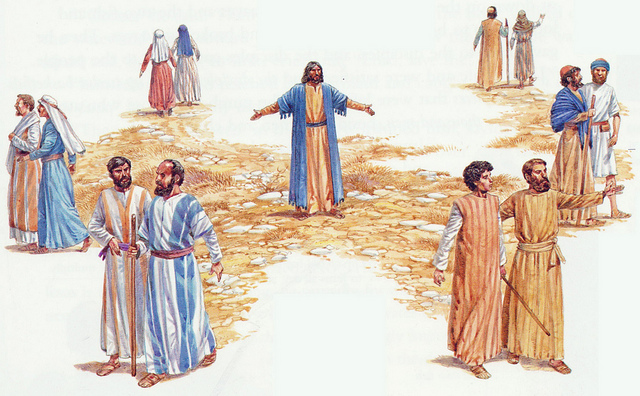 He picks himself up from what could have been a pity party, redefines home and helps his disciples do the same.
He picks himself up from what could have been a pity party, redefines home and helps his disciples do the same.
Scripture tells us that Jesus left and went among new villages to teach and preach.
Then, Jesus instructs his disciples how to do it too: sending them out in pairs of two. They would heal the sick; preach to the weary and live amongst people who would soon be called their new families.
And by the end of the disciples’ travels as they shared the good news of God’s love for all people, these folks would name the place of home differently too.
Their lives would be filled with the beauty of new people, new friendships and new brothers and sisters for all that lied ahead.
Might this be our gospel calling this week too?
For we also have the choice—the choice to stay home in the midst of the familiar OR to follow Jesus.
BUT knowing that as we do our Lord waits for us there.
Over three years ago now, my husband Kevin said yes to a calling to become the President of an international relief and development organization called Feed the Children.
While it was an amazing professional opportunity for him, it was a big and scary move for both of us. For this job came with the assignment of leaving our beloved home in Northern VA, a church I enjoyed leading, and friends that felt like family to us in the Washington DC area.
We needed to turn our gaze toward Oklahoma City, OK, the organization’s headquarters.
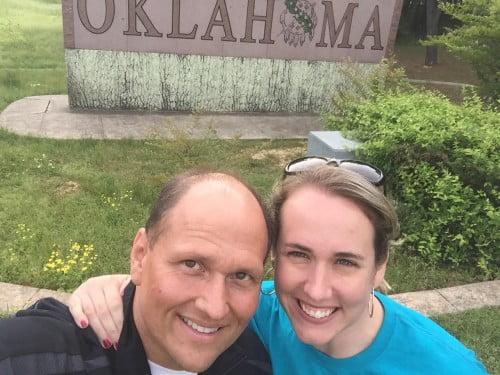 My first reaction when I heard this would even be a possibility for was, “OKLAHOMA? No, way, we couldn’t move there?”
My first reaction when I heard this would even be a possibility for was, “OKLAHOMA? No, way, we couldn’t move there?”Visions of red state politics and cowboys and people who had no appreciation for diversity came to mind.
And then when it became the final word as much as I wanted to be supportive of my husband and his work, it felt like great hardship to me to find something nice to say about the state that I would soon have an address in.
As we settled in, it seemed to get worse and worse. I couldn’t find a job. Denominational leaders told me that I would never work in the state simply because I was a woman. Folks wrote me off as “too East Coast” or “too liberal” before we knew each other. I frequently told my husband, why? Why did we come to this place?
But then something happened. I made new friends. An opportunity found me to begin to serve a church outside of the city. I met people who didn’t call me crazy—or maybe just their kind of crazy. And strangely the word, “home” started coming to my lips.
In a place I’d once scorned and begged to leave, I found home.
And I even shed tears (actually lots of tears) when my husband’s contract with this organization ended in May meant we would be moving back.
And then, last weekend, I shocked all of my DC friends, willingly going back to Oklahoma to visit without anyone paying me to do so. And people said to me, “Welcome home.” And I LOVED every minute of it.
It’s about re-defining home.
It’s about getting used to the pilgrimage way—a way where we aren’t bound by the values of the country where we live or the county where we were born.
It’s about seeing the beloved community of Christ in places all over the world that our Lord wants us to know.
Or simply put, to answer the question, “What is home?” we must see the world from God’s point of view, not an American point of view or the town we grew up in point of view.
A point of view that gives us connection to people beyond those biologically related to us.
A point of view that evaluates the laws of the land over what it means to love both God and neighbor.
 A point of view that most of all protects, champions and cares for the strangers among us.
A point of view that most of all protects, champions and cares for the strangers among us.For we’re Christian’s aren’t we?
Especially in times like these when racist, sexist and phobic remarks are said around us almost every day—it’s good to remember that we’re followers of another way other than the red, white and blue way. Our country of origin never gave us salvation and never will.
For, we’re followers of Jesus whose love and reign well extends beyond the boarders of this land called America. And its our calling to show it.
So my friends, what is home for you?
Thanks be to God for the gift of "home" in places we didn't expect.
AMEN